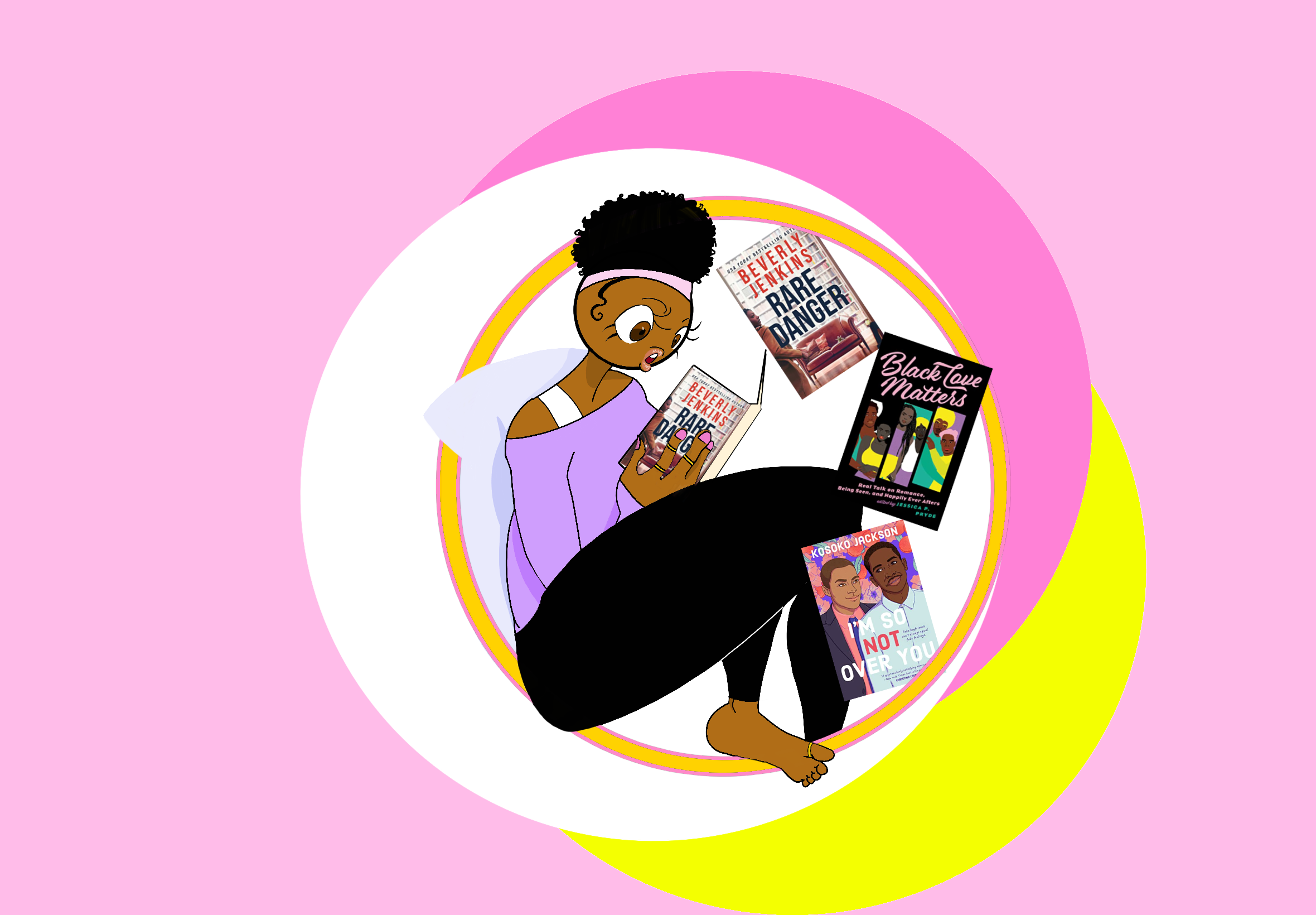Graphic by Mari Al Tayb ‘26.
By Amelia Potter ’26
Staff Writer
February marks Black History Month, which aims, according to the U.S. government’s website on the topic, to “seize the opportunity to honor the too-often neglected accomplishments of Black Americans in every area of endeavor throughout our history.” Under this umbrella is the rich selection of romance books written by Black authors which celebrate and uplift Black love. Here are three romance books authored by Black writers to read this Valentine’s Day.
‘Rare Danger’ by Beverly Jenkins
“Rare Danger” is part romance, part adventure and part murder-mystery, according to Goodreads, as it follows the plight of librarian Jasmine Ware and Air Force veteran Torr Noble, now a private security consultant. At just 110 pages, “Rare Danger” is a fun and fast-paced read, one Goodreads reviewer wrote, with well-developed, “amazing” characters. The plot kickstarts with the mysterious disappearance of a rare books dealer, an old friend of Jasmine’s, whose partner is then suspiciously murdered. This leads to page-turning tension as Jasmine and Torr must unite to unravel the secret plot, find the missing book dealer and possibly discover romance along the way. Full of chemistry and suspense, “Rare Danger” is an excellent, genre-blending read.
Author Beverly Jenkins is from Detroit, Michigan, and graduated from Michigan State University. In 2013, she was nominated for the 2013 NAACP Image Award. She has won the 2016 Romantic Times Reviewers’ Choice Award for historical romances, the 2017 Romance Writers of America Nora Roberts Lifetime Achievement Award, and the 2018 Michigan Author Award, as reported by Goodreads. Her oeuvre consists of stories both “historical and contemporary” with a “particular focus on 19th century African-American life.” As stated in her Wikipedia page, Jenkins sets her romances during a time “of African-American history that she believes is often overlooked”
‘Black Love Matters’ edited by Jessica P. Pryde
In her first published book, Jessica Pryde, a librarian and podcaster, set out to “discuss often overlooked narratives regarding the joyfulness of Black love.” “Black Love Matters” is a collection of essays, described by Kirkus as an “anthology that collects a refreshingly wide variety of perspectives on Black love.” The compilation includes the voices of academics, authors, reviewers and readers who examine the depiction of Black love in popular culture, through films, shows and novels, Goodreads reports. In her introduction, Pryde writes, “For more than 400 years, people of African descent have been treated abysmally in many nations of the world … Yet, whether free or enslaved, Black people throughout history have been able to find romantic love — regardless of their ability to marry — both inside and outside their own communities.” The essayists also unpack the traditional “white-centered nature of most romance novels — and novels in general,” along with the many challenges Black authors face in the publishing industry.
Pryde currently lives in Tucson, Arizona, and is the co-host of the podcast When in Romance. She is also a contributing editor of Book Riot. She earned her undergraduate degree from Washington University in Saint Louis, and later attended San Jose State University. Although “Black Love Matters” is currently her only book, written in February of 2022, she hints on her blog of possible new works of fiction to come.
‘I’m So (Not) Over You’ by Kosoko Jackson
“I’m So (Not) Over You” follows aspiring journalist Kian Andrews, who is unexpectedly enlisted by his ex-boyfriend Hudson Rivers to stage an active relationship for the sake of Hudson’s wealthy parents. Incentivized by Hudson’s promise to promote his career in journalism and enduring feelings for his old boyfriend, Kian agrees. Publishers Weekly calls it a “multilayered queer rom-com that combines fun fake dating and second chance romance tropes while exploring timely social themes.” When the pretend relationship begins feeling all too real, both men are forced to face their true feelings. “Beneath the rom-com antics,” Publishers Weekly continues in their review, “Jackson uses the pair’s differing economic backgrounds to explore wealth inequality in America. With his majority Black cast, he also highlights the intersections of class and race.”
Kosoko Jackson was born in the DC Metro Area, and presently lives in Brooklyn, New York. His personal essays have been published in The Advocate, Mediumand Thought Catalog. “I’m So (Not) Over You” was published Feb. 22, 2022, and represents his debut in adult fiction. Jackson has also authored the YA novel, “Yesterday is History,” and the more recent novel, “Survive the Dome.”


